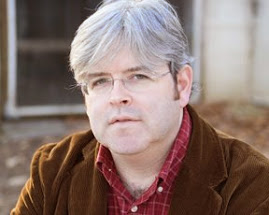 Terrific news for me and for Balkans via Bohemia readers: Two of my best pals (who happen to be terrific fiction writers) have new stories on the Interwebs.
Terrific news for me and for Balkans via Bohemia readers: Two of my best pals (who happen to be terrific fiction writers) have new stories on the Interwebs.First up is John Strausbaugh. The former New York Press editor wrote some really terrific fiction in the 1980s and early 1990s before he got sucked up into the journalism/nonfiction game, and the fact that he's posted four new stories up on his author website is the best news I've heard in a long time.
Not going to ruin the stories for you. They're terrific and you should read them.
Those who already know Strausbaugh's fiction from works including Flying Fish and Going Out and Poems/Prose are going to be delighted. And if you only know and like Strausbaugh's nonfiction work (see a recent interview with him about those books here), you'll find that the stories have all the energy and smarts in those books with even thornier barbs and a couple buckets of madcap wit.
Oh, hell. A bit from "The Fiery Sward," just as a teaser. God's quizzing angels Gabriel and Belbab about certain elements of Creation:
"Yes yes," God muttered. "Look here, what do you know about this thing called a Brussels sprout?"
Gabriel raised an eyebrow. He glanced at the top of Belbab's head.
"Brussels," Belbab recited. "One of a number of compact groups of habitats in which the humans will dwell after the development of agriculture and the domestication of animals. Sprout, the unmaturated — "
"What about it, Lord?" Gabriel cut him off.
"Did I create it?" God asked him.
Gabriel raised his hands over his head and lowered his eyes. "O most great and all powerful God," he orated in a spectacular, ringing voice, "is there a single thing living or inert which thou in thy boundless wisdom didst not fashion? Is there a single blade of grass, a solitary atom in the vast deeps of deepest space which thou didst not — "
"Don't patronize me," God snapped.
Gabriel lowered his hands. "I'll have to check the plans," he said. "Is there a problem with the Brussels sprout?"
"Adam doesn't like it," God said.
"Oh," Gabriel replied, and his face took on an inscrutability they all got lately when they were trying to hide their thoughts from God. "Adam doesn't like it. I see. Yeah well then we'll get right on it. A course."
"And while you're at it look into this mosquito creature."
"Lord?"
"Mo-skee-to," God said.
Added bonus? Strausbaugh's convinced some of the best illustrators from his tenure at New York Press -- former art director Michael Gentile (whose illo for "Teenagers from Earth!"adorns this post) and Takeshi Tadatsu -- to contribute drawings.
* * * * *
Also stepping up to the fiction plate in late December is my friend and former Chronicle of Higher Education colleague Jennifer Howard, who has three short pieces up in the new issue of The Collagist. (The magazine's blog also features an interview with Jennifer.)
Jennifer's sense of economy and fun in these pieces makes "flash fiction" seem like something a lot more long-lasting and satisfying. Check them out!


